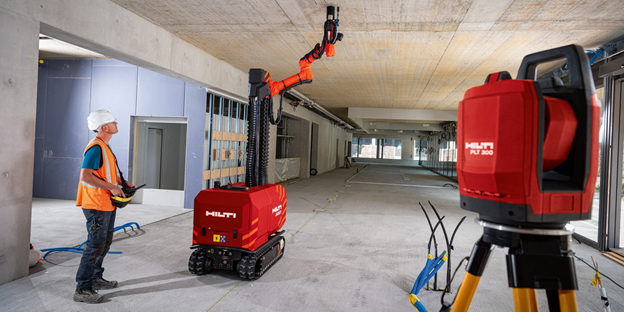1. Construction Management Software
Few top ones are:
1. Procore2. CoConstruct/Project Sight
3. BIM 360 Docs
4. PlanGrid
5 Bluebeam Studio
2. Robotics
Technological advancements within the
industry aren’t limited to only software. Drone usage is becoming increasingly
fashionable for construction companies because of its technological advancement
and inaccessible reach. Drones, sometimes mentioned as Unmanned Aerial
Vehicles (UAV’s), are useful on construction sites for surveying the task site
and ensuring workers are kept out of doubtless dangerous situations. Unmanned
operation, clean and crisp imaging technology, and capable of conducting
surveillance & inspections, these robots have made the process of
construction appear safer and seamless.
The most recent innovations apart from the great Drone are:
1. HILTI JAIBOT – Semi-autonomous Penetration and Drilling Robot
2. FBR Hadrian x – The World’s First Autonomous Brick-laying
Robot
3. Atlant 4000 – Demolition Robot
3. Green Construction
As the civilization slowly moves
towards better and enriched methods of development, the concept of Green
Buildings is steadily catching up too. Reducing carbon footprint per building
per person to effectively reduce net carbon emission is one of the underlying
fundamentals of this model. As increasingly more buildings and plans
are searching for ways to include sustainability into the development process,
Green construction is the future of this Brick Mortar Industry and would make
it environmentally responsible and resource-efficient too.
There are various building certifications
that built-up spaces have to qualify to be called Green Buildings. Listed below
are the most common 5:
1. LEED – Leadership in Energy and Environmental Design; Issuing Body: U.S. Green Buildings Council
2. Energy Star; Issuing Body: Department of Energy and the Environmental Protection Agency
3. BREEAM - Building Research Establishment Environmental Assessment Method; Issuing Body: BREEAM
4. Green Globes - Green Globes certification program; Issuing Body: The Green Building Initiative.
5. NBGS Green - National Green Building Standard; Issuing Body: National Association of Home Builders
4. Modular and Prefabricated
Construction
The upcoming decade undoubtedly will
see greater recognition of modular and prefabricated construction projects.
Modular construction companies are making waves within the industry due to the
significantly expedited rate at which they’ve completed residential and
commercial buildings. Prefab is gaining superior acknowledgment due to the
factory-made aspect which involves pre-stressing the construction member and
testing its limits even before it is actually used. This is surely one of the
many reasons pre-fab is gaining the momentum that it is. In fact, the modular
construction market contains a projected annual rate of growth of 6.9%, being
valued at up to $157 billion by 2023.
5. BIM (Building Information Modeling)
Building information modeling, or BIM,
is another growing industry trend that is being employed by a larger number of
Projects today. BIM is a way of representing buildings, roads, and utilities
through the computer (software)-generated images to assist contractors to visualize
a construction process before it's built.
Architects and engineers can use the models to visualize how building materials will perform over time. If a subcontractor can visualize their part of the project before beginning work, they will accurately estimate what proportion of a particular material is required. This visualization capability reduces the quantity of wasted time, labor, and materials on a project.
The top 2 methods of commissioning BIM in construction projects are:
1. Laser Scanning and Image Rendering
2. Clash Coordination using various Project Management/ Design Review Software – Structural, Architectural, and All other Trades involved.
Apart from these top 5, there is a long list of other smaller ones – Augmented Reality, HD Surveying, Geo-location, IoT, Self-healing Concrete, and Cloud collaboration amongst others. The Construction industry may have taken a hit in the past few years but, today, the overall outlook seems positive given the new and innovative techniques that the Industry is slowly yet steadily picking up. Whatever the case may be, the industry has always and will forever keep adding to the infrastructure of the society!
For more such trending and
buzz-inspiring content, stay tuned to















Comments
Post a Comment